HSC203 Indigenous Health: Narrative of an Aboriginal Person
VerifiedAdded on 2023/04/11
|7
|1374
|365
Essay
AI Summary
This essay presents a narrative of Mr. Rodney Graham, an Aboriginal man's journey with colorectal cancer, highlighting the disparities in healthcare access and outcomes between Indigenous and non-Indigenous Australians. It discusses the prevalence of cancer among Aboriginal people, particularly colorectal cancer, and compares incidence and mortality rates with the non-Indigenous population. The essay also explores the potential post-operative complications of colorectal cancer and suggests lifestyle changes for Mr. Graham, such as giving up drinking and adopting a fiber-rich diet. Furthermore, it addresses the impact of such illnesses on the family and community, emphasizing the need for support and awareness. The essay concludes by referencing statistics on colorectal cancer within the Aboriginal and Torres Strait Islander community, underscoring the lower survival rates compared to non-Indigenous Australians.
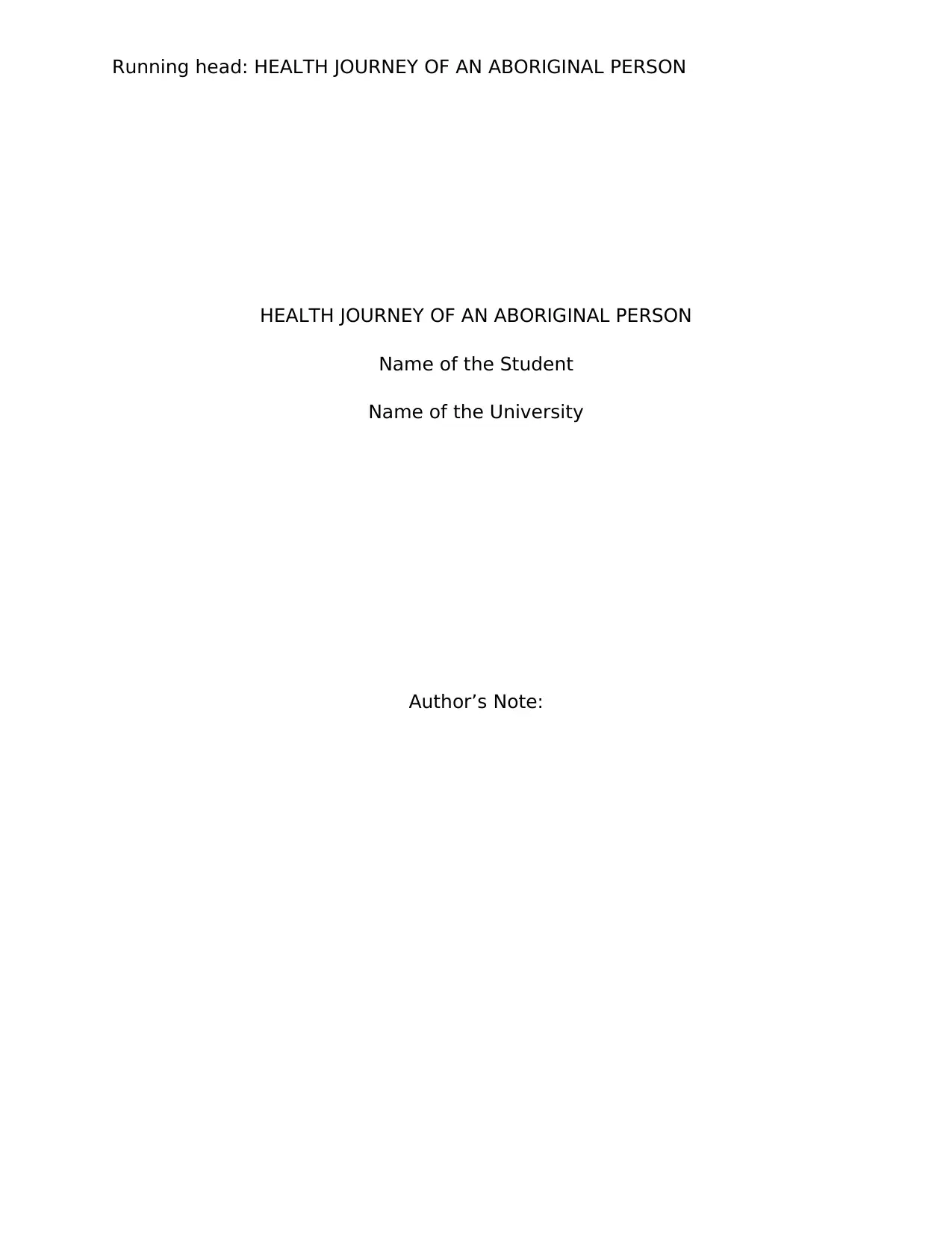
Running head: HEALTH JOURNEY OF AN ABORIGINAL PERSON
HEALTH JOURNEY OF AN ABORIGINAL PERSON
Name of the Student
Name of the University
Author’s Note:
HEALTH JOURNEY OF AN ABORIGINAL PERSON
Name of the Student
Name of the University
Author’s Note:
Paraphrase This Document
Need a fresh take? Get an instant paraphrase of this document with our AI Paraphraser
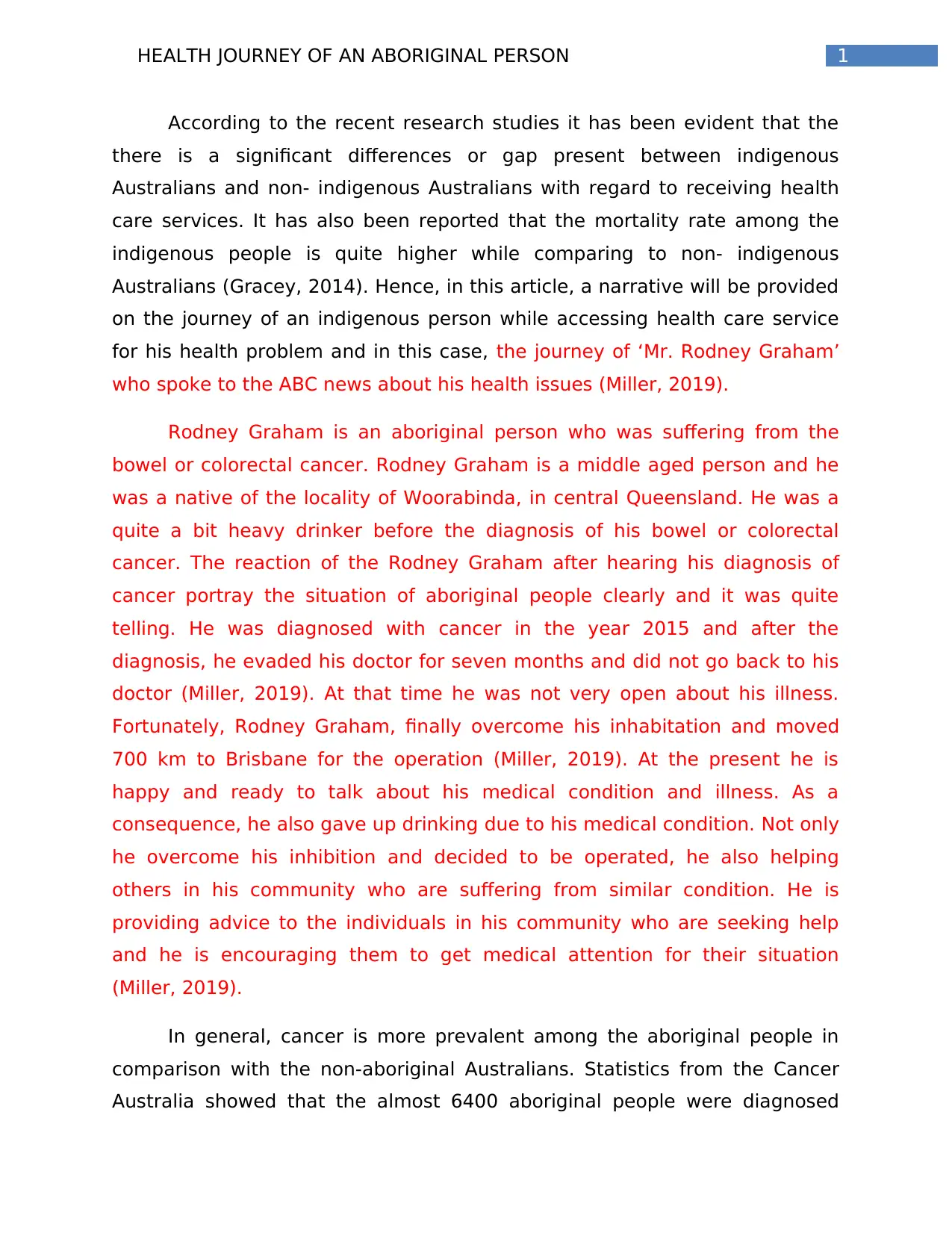
1HEALTH JOURNEY OF AN ABORIGINAL PERSON
According to the recent research studies it has been evident that the
there is a significant differences or gap present between indigenous
Australians and non- indigenous Australians with regard to receiving health
care services. It has also been reported that the mortality rate among the
indigenous people is quite higher while comparing to non- indigenous
Australians (Gracey, 2014). Hence, in this article, a narrative will be provided
on the journey of an indigenous person while accessing health care service
for his health problem and in this case, the journey of ‘Mr. Rodney Graham’
who spoke to the ABC news about his health issues (Miller, 2019).
Rodney Graham is an aboriginal person who was suffering from the
bowel or colorectal cancer. Rodney Graham is a middle aged person and he
was a native of the locality of Woorabinda, in central Queensland. He was a
quite a bit heavy drinker before the diagnosis of his bowel or colorectal
cancer. The reaction of the Rodney Graham after hearing his diagnosis of
cancer portray the situation of aboriginal people clearly and it was quite
telling. He was diagnosed with cancer in the year 2015 and after the
diagnosis, he evaded his doctor for seven months and did not go back to his
doctor (Miller, 2019). At that time he was not very open about his illness.
Fortunately, Rodney Graham, finally overcome his inhabitation and moved
700 km to Brisbane for the operation (Miller, 2019). At the present he is
happy and ready to talk about his medical condition and illness. As a
consequence, he also gave up drinking due to his medical condition. Not only
he overcome his inhibition and decided to be operated, he also helping
others in his community who are suffering from similar condition. He is
providing advice to the individuals in his community who are seeking help
and he is encouraging them to get medical attention for their situation
(Miller, 2019).
In general, cancer is more prevalent among the aboriginal people in
comparison with the non-aboriginal Australians. Statistics from the Cancer
Australia showed that the almost 6400 aboriginal people were diagnosed
According to the recent research studies it has been evident that the
there is a significant differences or gap present between indigenous
Australians and non- indigenous Australians with regard to receiving health
care services. It has also been reported that the mortality rate among the
indigenous people is quite higher while comparing to non- indigenous
Australians (Gracey, 2014). Hence, in this article, a narrative will be provided
on the journey of an indigenous person while accessing health care service
for his health problem and in this case, the journey of ‘Mr. Rodney Graham’
who spoke to the ABC news about his health issues (Miller, 2019).
Rodney Graham is an aboriginal person who was suffering from the
bowel or colorectal cancer. Rodney Graham is a middle aged person and he
was a native of the locality of Woorabinda, in central Queensland. He was a
quite a bit heavy drinker before the diagnosis of his bowel or colorectal
cancer. The reaction of the Rodney Graham after hearing his diagnosis of
cancer portray the situation of aboriginal people clearly and it was quite
telling. He was diagnosed with cancer in the year 2015 and after the
diagnosis, he evaded his doctor for seven months and did not go back to his
doctor (Miller, 2019). At that time he was not very open about his illness.
Fortunately, Rodney Graham, finally overcome his inhabitation and moved
700 km to Brisbane for the operation (Miller, 2019). At the present he is
happy and ready to talk about his medical condition and illness. As a
consequence, he also gave up drinking due to his medical condition. Not only
he overcome his inhibition and decided to be operated, he also helping
others in his community who are suffering from similar condition. He is
providing advice to the individuals in his community who are seeking help
and he is encouraging them to get medical attention for their situation
(Miller, 2019).
In general, cancer is more prevalent among the aboriginal people in
comparison with the non-aboriginal Australians. Statistics from the Cancer
Australia showed that the almost 6400 aboriginal people were diagnosed
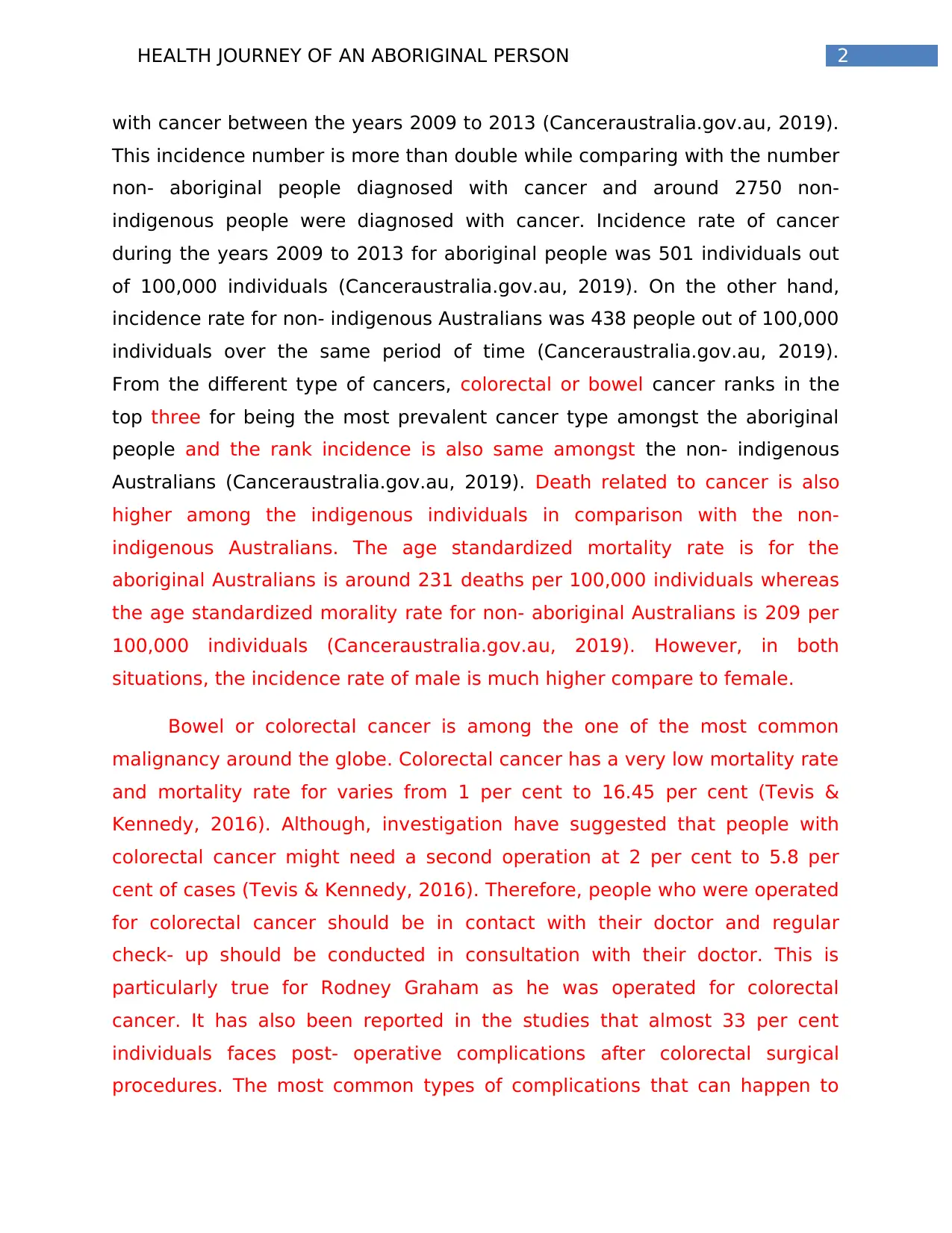
2HEALTH JOURNEY OF AN ABORIGINAL PERSON
with cancer between the years 2009 to 2013 (Canceraustralia.gov.au, 2019).
This incidence number is more than double while comparing with the number
non- aboriginal people diagnosed with cancer and around 2750 non-
indigenous people were diagnosed with cancer. Incidence rate of cancer
during the years 2009 to 2013 for aboriginal people was 501 individuals out
of 100,000 individuals (Canceraustralia.gov.au, 2019). On the other hand,
incidence rate for non- indigenous Australians was 438 people out of 100,000
individuals over the same period of time (Canceraustralia.gov.au, 2019).
From the different type of cancers, colorectal or bowel cancer ranks in the
top three for being the most prevalent cancer type amongst the aboriginal
people and the rank incidence is also same amongst the non- indigenous
Australians (Canceraustralia.gov.au, 2019). Death related to cancer is also
higher among the indigenous individuals in comparison with the non-
indigenous Australians. The age standardized mortality rate is for the
aboriginal Australians is around 231 deaths per 100,000 individuals whereas
the age standardized morality rate for non- aboriginal Australians is 209 per
100,000 individuals (Canceraustralia.gov.au, 2019). However, in both
situations, the incidence rate of male is much higher compare to female.
Bowel or colorectal cancer is among the one of the most common
malignancy around the globe. Colorectal cancer has a very low mortality rate
and mortality rate for varies from 1 per cent to 16.45 per cent (Tevis &
Kennedy, 2016). Although, investigation have suggested that people with
colorectal cancer might need a second operation at 2 per cent to 5.8 per
cent of cases (Tevis & Kennedy, 2016). Therefore, people who were operated
for colorectal cancer should be in contact with their doctor and regular
check- up should be conducted in consultation with their doctor. This is
particularly true for Rodney Graham as he was operated for colorectal
cancer. It has also been reported in the studies that almost 33 per cent
individuals faces post- operative complications after colorectal surgical
procedures. The most common types of complications that can happen to
with cancer between the years 2009 to 2013 (Canceraustralia.gov.au, 2019).
This incidence number is more than double while comparing with the number
non- aboriginal people diagnosed with cancer and around 2750 non-
indigenous people were diagnosed with cancer. Incidence rate of cancer
during the years 2009 to 2013 for aboriginal people was 501 individuals out
of 100,000 individuals (Canceraustralia.gov.au, 2019). On the other hand,
incidence rate for non- indigenous Australians was 438 people out of 100,000
individuals over the same period of time (Canceraustralia.gov.au, 2019).
From the different type of cancers, colorectal or bowel cancer ranks in the
top three for being the most prevalent cancer type amongst the aboriginal
people and the rank incidence is also same amongst the non- indigenous
Australians (Canceraustralia.gov.au, 2019). Death related to cancer is also
higher among the indigenous individuals in comparison with the non-
indigenous Australians. The age standardized mortality rate is for the
aboriginal Australians is around 231 deaths per 100,000 individuals whereas
the age standardized morality rate for non- aboriginal Australians is 209 per
100,000 individuals (Canceraustralia.gov.au, 2019). However, in both
situations, the incidence rate of male is much higher compare to female.
Bowel or colorectal cancer is among the one of the most common
malignancy around the globe. Colorectal cancer has a very low mortality rate
and mortality rate for varies from 1 per cent to 16.45 per cent (Tevis &
Kennedy, 2016). Although, investigation have suggested that people with
colorectal cancer might need a second operation at 2 per cent to 5.8 per
cent of cases (Tevis & Kennedy, 2016). Therefore, people who were operated
for colorectal cancer should be in contact with their doctor and regular
check- up should be conducted in consultation with their doctor. This is
particularly true for Rodney Graham as he was operated for colorectal
cancer. It has also been reported in the studies that almost 33 per cent
individuals faces post- operative complications after colorectal surgical
procedures. The most common types of complications that can happen to
⊘ This is a preview!⊘
Do you want full access?
Subscribe today to unlock all pages.

Trusted by 1+ million students worldwide
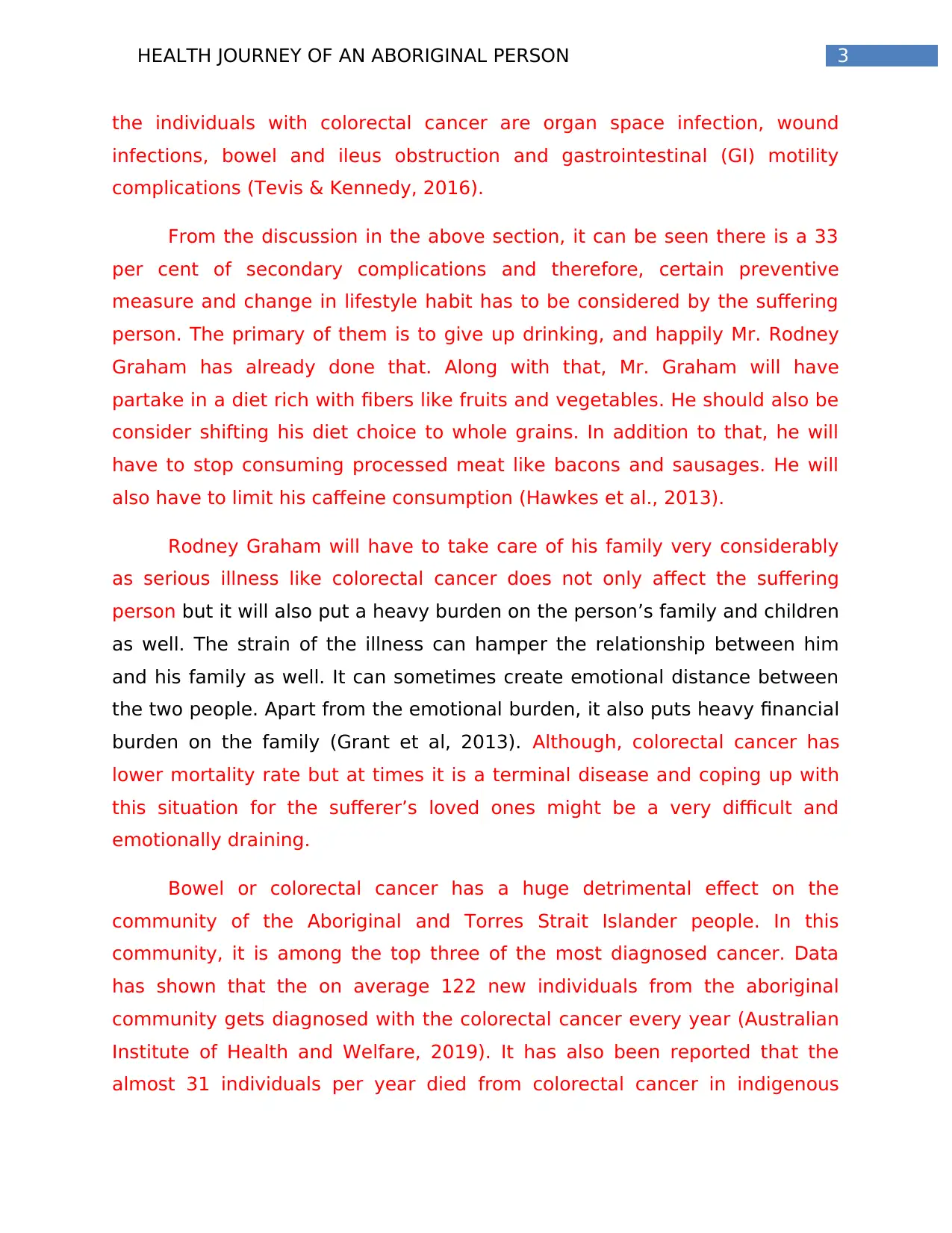
3HEALTH JOURNEY OF AN ABORIGINAL PERSON
the individuals with colorectal cancer are organ space infection, wound
infections, bowel and ileus obstruction and gastrointestinal (GI) motility
complications (Tevis & Kennedy, 2016).
From the discussion in the above section, it can be seen there is a 33
per cent of secondary complications and therefore, certain preventive
measure and change in lifestyle habit has to be considered by the suffering
person. The primary of them is to give up drinking, and happily Mr. Rodney
Graham has already done that. Along with that, Mr. Graham will have
partake in a diet rich with fibers like fruits and vegetables. He should also be
consider shifting his diet choice to whole grains. In addition to that, he will
have to stop consuming processed meat like bacons and sausages. He will
also have to limit his caffeine consumption (Hawkes et al., 2013).
Rodney Graham will have to take care of his family very considerably
as serious illness like colorectal cancer does not only affect the suffering
person but it will also put a heavy burden on the person’s family and children
as well. The strain of the illness can hamper the relationship between him
and his family as well. It can sometimes create emotional distance between
the two people. Apart from the emotional burden, it also puts heavy financial
burden on the family (Grant et al, 2013). Although, colorectal cancer has
lower mortality rate but at times it is a terminal disease and coping up with
this situation for the sufferer’s loved ones might be a very difficult and
emotionally draining.
Bowel or colorectal cancer has a huge detrimental effect on the
community of the Aboriginal and Torres Strait Islander people. In this
community, it is among the top three of the most diagnosed cancer. Data
has shown that the on average 122 new individuals from the aboriginal
community gets diagnosed with the colorectal cancer every year (Australian
Institute of Health and Welfare, 2019). It has also been reported that the
almost 31 individuals per year died from colorectal cancer in indigenous
the individuals with colorectal cancer are organ space infection, wound
infections, bowel and ileus obstruction and gastrointestinal (GI) motility
complications (Tevis & Kennedy, 2016).
From the discussion in the above section, it can be seen there is a 33
per cent of secondary complications and therefore, certain preventive
measure and change in lifestyle habit has to be considered by the suffering
person. The primary of them is to give up drinking, and happily Mr. Rodney
Graham has already done that. Along with that, Mr. Graham will have
partake in a diet rich with fibers like fruits and vegetables. He should also be
consider shifting his diet choice to whole grains. In addition to that, he will
have to stop consuming processed meat like bacons and sausages. He will
also have to limit his caffeine consumption (Hawkes et al., 2013).
Rodney Graham will have to take care of his family very considerably
as serious illness like colorectal cancer does not only affect the suffering
person but it will also put a heavy burden on the person’s family and children
as well. The strain of the illness can hamper the relationship between him
and his family as well. It can sometimes create emotional distance between
the two people. Apart from the emotional burden, it also puts heavy financial
burden on the family (Grant et al, 2013). Although, colorectal cancer has
lower mortality rate but at times it is a terminal disease and coping up with
this situation for the sufferer’s loved ones might be a very difficult and
emotionally draining.
Bowel or colorectal cancer has a huge detrimental effect on the
community of the Aboriginal and Torres Strait Islander people. In this
community, it is among the top three of the most diagnosed cancer. Data
has shown that the on average 122 new individuals from the aboriginal
community gets diagnosed with the colorectal cancer every year (Australian
Institute of Health and Welfare, 2019). It has also been reported that the
almost 31 individuals per year died from colorectal cancer in indigenous
Paraphrase This Document
Need a fresh take? Get an instant paraphrase of this document with our AI Paraphraser
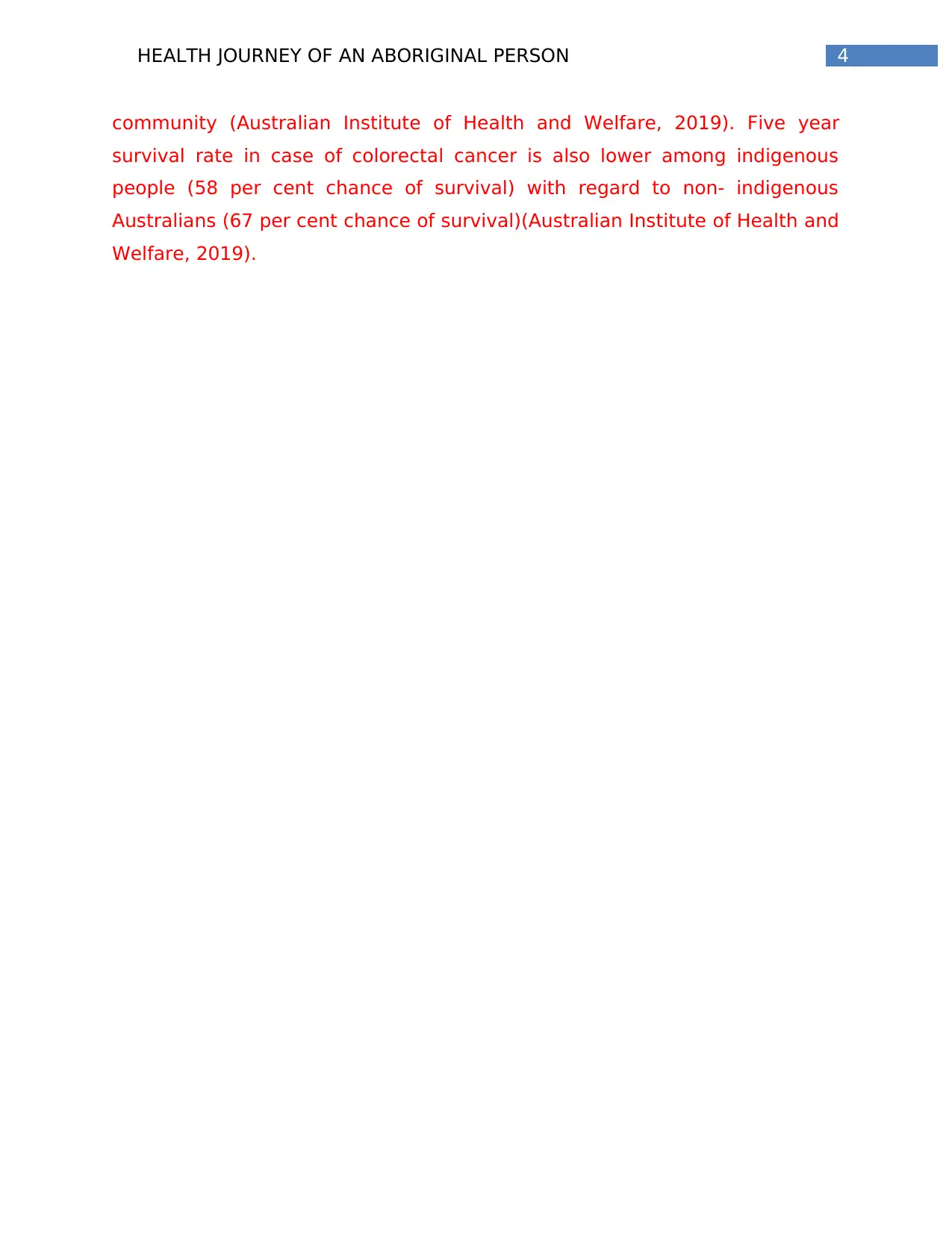
4HEALTH JOURNEY OF AN ABORIGINAL PERSON
community (Australian Institute of Health and Welfare, 2019). Five year
survival rate in case of colorectal cancer is also lower among indigenous
people (58 per cent chance of survival) with regard to non- indigenous
Australians (67 per cent chance of survival)(Australian Institute of Health and
Welfare, 2019).
community (Australian Institute of Health and Welfare, 2019). Five year
survival rate in case of colorectal cancer is also lower among indigenous
people (58 per cent chance of survival) with regard to non- indigenous
Australians (67 per cent chance of survival)(Australian Institute of Health and
Welfare, 2019).
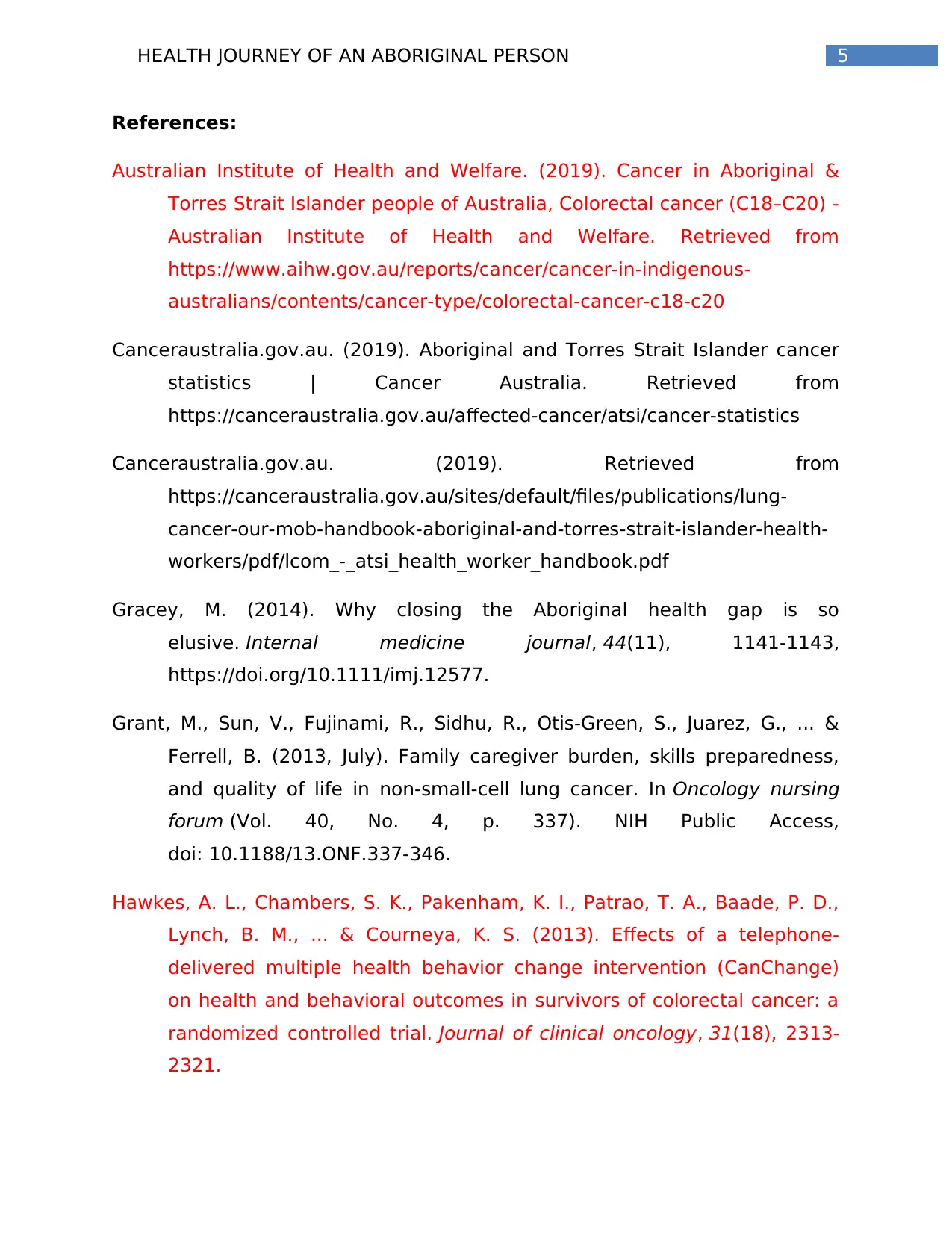
5HEALTH JOURNEY OF AN ABORIGINAL PERSON
References:
Australian Institute of Health and Welfare. (2019). Cancer in Aboriginal &
Torres Strait Islander people of Australia, Colorectal cancer (C18–C20) -
Australian Institute of Health and Welfare. Retrieved from
https://www.aihw.gov.au/reports/cancer/cancer-in-indigenous-
australians/contents/cancer-type/colorectal-cancer-c18-c20
Canceraustralia.gov.au. (2019). Aboriginal and Torres Strait Islander cancer
statistics | Cancer Australia. Retrieved from
https://canceraustralia.gov.au/affected-cancer/atsi/cancer-statistics
Canceraustralia.gov.au. (2019). Retrieved from
https://canceraustralia.gov.au/sites/default/files/publications/lung-
cancer-our-mob-handbook-aboriginal-and-torres-strait-islander-health-
workers/pdf/lcom_-_atsi_health_worker_handbook.pdf
Gracey, M. (2014). Why closing the Aboriginal health gap is so
elusive. Internal medicine journal, 44(11), 1141-1143,
https://doi.org/10.1111/imj.12577.
Grant, M., Sun, V., Fujinami, R., Sidhu, R., Otis-Green, S., Juarez, G., ... &
Ferrell, B. (2013, July). Family caregiver burden, skills preparedness,
and quality of life in non-small-cell lung cancer. In Oncology nursing
forum (Vol. 40, No. 4, p. 337). NIH Public Access,
doi: 10.1188/13.ONF.337-346.
Hawkes, A. L., Chambers, S. K., Pakenham, K. I., Patrao, T. A., Baade, P. D.,
Lynch, B. M., ... & Courneya, K. S. (2013). Effects of a telephone-
delivered multiple health behavior change intervention (CanChange)
on health and behavioral outcomes in survivors of colorectal cancer: a
randomized controlled trial. Journal of clinical oncology, 31(18), 2313-
2321.
References:
Australian Institute of Health and Welfare. (2019). Cancer in Aboriginal &
Torres Strait Islander people of Australia, Colorectal cancer (C18–C20) -
Australian Institute of Health and Welfare. Retrieved from
https://www.aihw.gov.au/reports/cancer/cancer-in-indigenous-
australians/contents/cancer-type/colorectal-cancer-c18-c20
Canceraustralia.gov.au. (2019). Aboriginal and Torres Strait Islander cancer
statistics | Cancer Australia. Retrieved from
https://canceraustralia.gov.au/affected-cancer/atsi/cancer-statistics
Canceraustralia.gov.au. (2019). Retrieved from
https://canceraustralia.gov.au/sites/default/files/publications/lung-
cancer-our-mob-handbook-aboriginal-and-torres-strait-islander-health-
workers/pdf/lcom_-_atsi_health_worker_handbook.pdf
Gracey, M. (2014). Why closing the Aboriginal health gap is so
elusive. Internal medicine journal, 44(11), 1141-1143,
https://doi.org/10.1111/imj.12577.
Grant, M., Sun, V., Fujinami, R., Sidhu, R., Otis-Green, S., Juarez, G., ... &
Ferrell, B. (2013, July). Family caregiver burden, skills preparedness,
and quality of life in non-small-cell lung cancer. In Oncology nursing
forum (Vol. 40, No. 4, p. 337). NIH Public Access,
doi: 10.1188/13.ONF.337-346.
Hawkes, A. L., Chambers, S. K., Pakenham, K. I., Patrao, T. A., Baade, P. D.,
Lynch, B. M., ... & Courneya, K. S. (2013). Effects of a telephone-
delivered multiple health behavior change intervention (CanChange)
on health and behavioral outcomes in survivors of colorectal cancer: a
randomized controlled trial. Journal of clinical oncology, 31(18), 2313-
2321.
⊘ This is a preview!⊘
Do you want full access?
Subscribe today to unlock all pages.

Trusted by 1+ million students worldwide
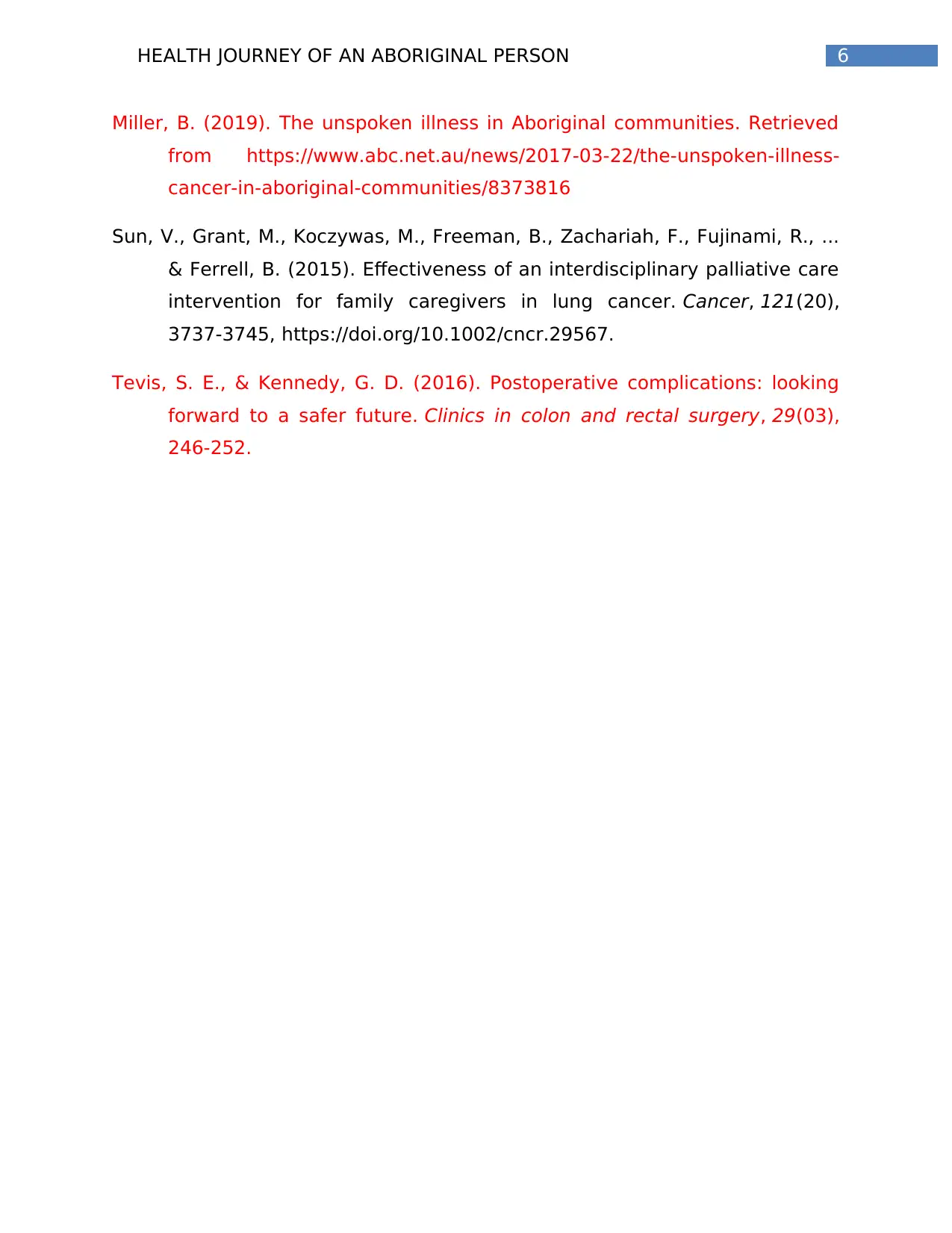
6HEALTH JOURNEY OF AN ABORIGINAL PERSON
Miller, B. (2019). The unspoken illness in Aboriginal communities. Retrieved
from https://www.abc.net.au/news/2017-03-22/the-unspoken-illness-
cancer-in-aboriginal-communities/8373816
Sun, V., Grant, M., Koczywas, M., Freeman, B., Zachariah, F., Fujinami, R., ...
& Ferrell, B. (2015). Effectiveness of an interdisciplinary palliative care
intervention for family caregivers in lung cancer. Cancer, 121(20),
3737-3745, https://doi.org/10.1002/cncr.29567.
Tevis, S. E., & Kennedy, G. D. (2016). Postoperative complications: looking
forward to a safer future. Clinics in colon and rectal surgery, 29(03),
246-252.
Miller, B. (2019). The unspoken illness in Aboriginal communities. Retrieved
from https://www.abc.net.au/news/2017-03-22/the-unspoken-illness-
cancer-in-aboriginal-communities/8373816
Sun, V., Grant, M., Koczywas, M., Freeman, B., Zachariah, F., Fujinami, R., ...
& Ferrell, B. (2015). Effectiveness of an interdisciplinary palliative care
intervention for family caregivers in lung cancer. Cancer, 121(20),
3737-3745, https://doi.org/10.1002/cncr.29567.
Tevis, S. E., & Kennedy, G. D. (2016). Postoperative complications: looking
forward to a safer future. Clinics in colon and rectal surgery, 29(03),
246-252.
1 out of 7
Related Documents
Your All-in-One AI-Powered Toolkit for Academic Success.
+13062052269
info@desklib.com
Available 24*7 on WhatsApp / Email
![[object Object]](/_next/static/media/star-bottom.7253800d.svg)
Unlock your academic potential
Copyright © 2020–2026 A2Z Services. All Rights Reserved. Developed and managed by ZUCOL.





